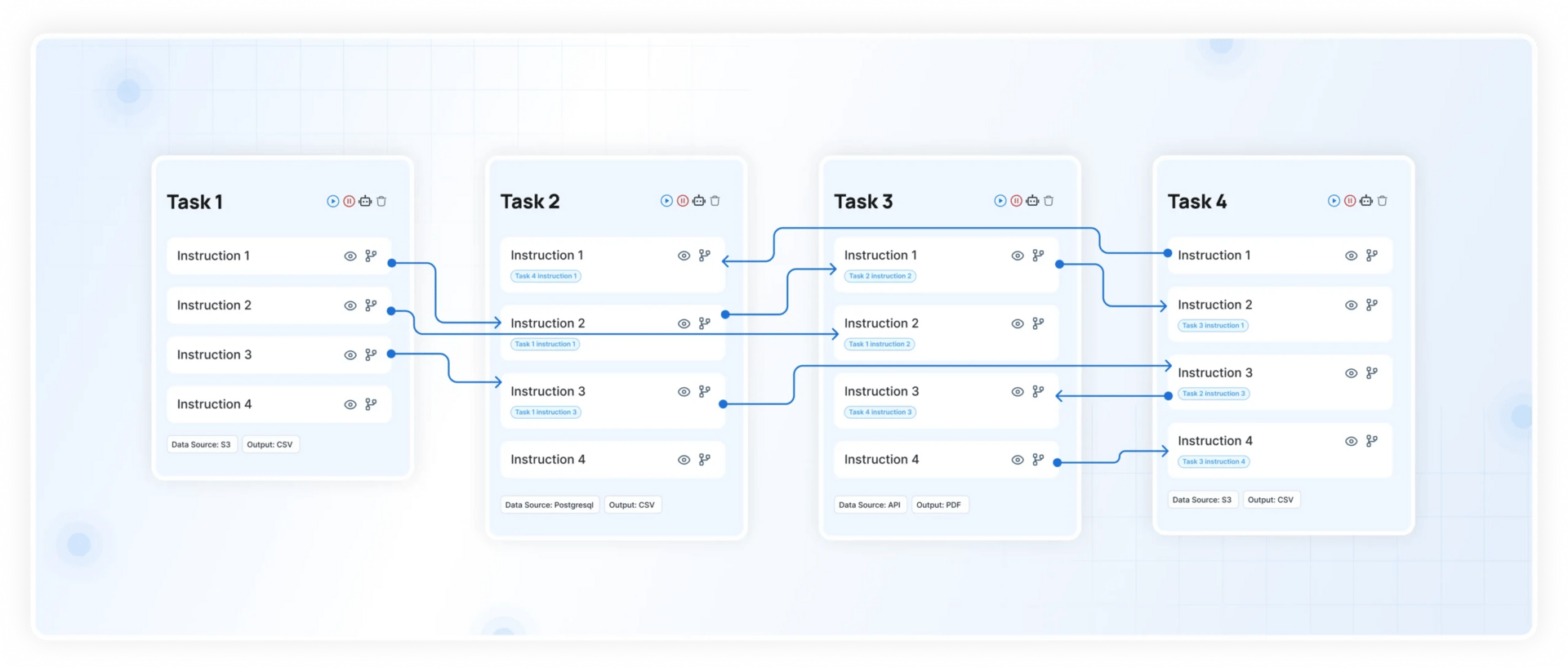- Towards AGI
- Posts
- The End of Traditional Car Buying?
The End of Traditional Car Buying?
GenAI to Influence 40M+ Journeys Yearly by 2030
Here is what’s new in the AI world.
AI news: GenAI’s 40M Car-Buying Impact by 2030
Open AI: GPT-5 Gets a Chinese, Open-Source Challenger
Hot Tea: Open Source Registries Begin Transitioning to Paid Models
OpenAI: SAP, OpenAI Launch Sovereign AI for Germany
GenAI to Influence Over 40 Million Car-Buying Journeys Annually by 2030
A new report from the Boston Consulting Group (BCG), conducted in partnership with OpenAI, predicts that generative AI (GenAI) will significantly transform the global automotive sales landscape.
By 2030, GenAI is expected to influence over 40 million car purchases annually, making the buying process more streamlined and personalized for consumers.
The study indicates that automakers who rapidly adopt AI-powered sales assistants could see their revenue increase by up to 20% by 2030.
Conversely, companies that are slow to integrate this technology risk losing up to 15% of their revenue due to customer attrition and increased price competition.
According to the report, GenAI will act as a neutral, brand-agnostic advisor, helping buyers with tasks like configuring vehicle options, comparing financing plans, and scheduling test drives.
This shift is likely to weaken traditional brand loyalty, as consumers begin to prioritize objective factors such as electric vehicle range, price, and environmental impact.
Crucial AI Platform Visibility: Automakers must enhance their presence on multi-brand AI marketplaces.
Investment in Branded AI Tools: Companies need to develop their own AI assistants to create hyper-personalized customer journeys.
Fast-Moving Markets Lead: This transformation will be most significant in rapid-adoption regions like Asia, where early adoption is critical for gaining market share.
GenAI as the Top Advisor: By 2030, generative AI is predicted to become the most influential advisor in the automotive industry.
Fundamental Industry Shift: This technology will fundamentally reshape car sales and purchasing processes.
Chinese Giant Meituan Claims Its Open-Source AI Model Rivals GPT-5
Chinese tech giant Meituan has launched a powerful suite of open-source large language models (LLMs), positioning itself as a major player in the global AI landscape.
The release includes two significant models: LongCat-Flash, a highly efficient 560-billion parameter model, and its advanced successor, LongCat-Flash-Thinking, which is specifically fine-tuned for complex reasoning tasks.
From Food Delivery to AI Frontier
Best known as a dominant food delivery and e-commerce super-app in China, Meituan is now making a strategic pivot into advanced AI.
With over 770 million users, the company is leveraging its vast scale and technical resources to compete at the forefront of AI development.
This move comes as part of a broader commitment to invest billions in AI and chip technology.
Shenzhen Airport partners with Meituan to deploy delivery robots, bringing food to your gate in 5 minutes. Fast, contactless, futuristic dining is here.
Explore how AI-powered robotics can elevate your business. Our company specializes in robot manufacturing. Contact us or— Johannes Maria (@luo_yuehan)
9:25 AM • Sep 16, 2025
The LongCat Model Family: Power and Efficiency
The LongCat series is built on a Mixture-of-Experts (MoE) architecture, which allows it to activate only a fraction of its total parameters for any given task. This design makes it both powerful and computationally efficient.
LongCat-Flash: Released in late August 2025, this model serves as a strong general-purpose foundation. It achieves impressive benchmark scores in instruction following, coding, and reasoning, rivaling many established proprietary models, all while maintaining high inference speeds.
LongCat-Flash-Thinking: Released in September 2025, this model represents a significant leap in AI reasoning. It was trained using a specialized two-phase process that emphasizes logical thinking, mathematics, and problem-solving. In benchmarks, it competes with, and in some cases, surpasses top-tier proprietary models like GPT-5, particularly in areas like theorem proving and safety.
Key Advantages for Enterprises
For technical decision-makers and enterprises, the LongCat ecosystem offers several compelling benefits:
Open Access and Cost-Efficiency: Both models are available under the permissive MIT license, allowing free commercial use. Meituan also offers a generous free API quota (500,000 tokens daily, extendable to 5 million), making it highly accessible for development and testing.
Superior Reasoning at Lower Cost: A key breakthrough is its efficiency. LongCat-Flash-Thinking reportedly reduces token consumption by up to 64.5% on complex problems without sacrificing accuracy, leading to significantly lower inference costs.
Deployment-Ready: Meituan has released detailed technical reports on optimizing the model for large-scale deployment, addressing critical challenges like latency and throughput to ensure it is practical for enterprise use.
What This Means for the AI Industry?
Meituan’s releases demonstrate a systematic approach to building a complete AI ecosystem, from a powerful base model to specialized reasoning capabilities and robust deployment tools.
For enterprises worldwide, it provides a formidable open-source alternative to closed, proprietary models from Western companies.
The success of LongCat underscores the rapid innovation in the global open-source AI community and gives organizations more choice and flexibility when deploying advanced AI solutions.
However, this expanding ecosystem of powerful models also introduces a new layer of complexity: effectively managing, governing, and integrating these diverse AI assets into secure enterprise workflows. This is where a strategic data intelligence platform becomes critical.
DataManagement.AI empowers organizations to harness this flexibility by providing a unified Context Cloud to govern all AI assets, whether open-source or proprietary, ensuring robust security, cost control, and seamless integration across the entire data landscape.

By offering a single pane of glass for AI orchestration and data governance, it turns the challenge of choice into a sustainable competitive advantage.
Open Source Isn't Free Anymore, Thanks to AI

In an unprecedented move, eight of the world's leading open-source foundations have issued a joint warning that the donation-based funding model for the software package registries that power global software development is "dangerously fragile" and unsustainable.
The organizations, including the Python Software Foundation, Rust Foundation, and Eclipse Foundation, stated that their registries, which handle trillions of downloads annually, are facing a "critical inflection point" due to exploding demand from commercial users who do not provide proportional financial support.
These registries, such as PyPI (Python), npm (JavaScript), and Maven Central (Java), are essential infrastructure for nearly every modern enterprise software pipeline.
The Core Problem: Commercial Use Without Commercial Support
The foundations highlighted that automated corporate systems, like continuous integration (CI/CD) pipelines, dependency scanners, and AI agents, place "enormous strain" on their infrastructure.
They noted that the rise of generative AI has worsened the problem, leading to a surge of inefficient, machine-driven requests that often lack basic caching.
openai charges $200/month for deep research
i made it free and open source 👇
— fekri (@fekdaoui)
8:55 AM • Feb 10, 2025
This unsustainable growth in consumption is happening alongside new regulatory burdens, such as the EU's Cyber Resilience Act.
The foundations revealed that while demand is growing exponentially, financial support from sponsors is increasing only linearly, creating a massive funding gap.
A Call for Change: The End of the "Free Ride"
The warning follows incidents like the 2021 Log4Shell vulnerability, which exposed the internet's critical reliance on underfunded open-source projects. The foundations made it clear that changes to access and funding models are inevitable.
They are now exploring solutions familiar to enterprises, including:
Tiered access models that provide scaled performance for high-volume commercial users.
Institutional partnerships where companies contribute funding in proportion to their usage.
The unified message to businesses is clear: the era of consuming these critical services for free is ending.
Companies are urged to immediately review their practices, implement caching, reduce wasteful traffic, and engage with the foundations about making proportional contributions to ensure this essential infrastructure remains viable.
SAP and OpenAI Partner on Sovereign Cloud Solution
SAP and OpenAI have announced a new partnership, "OpenAI for Germany," designed to deliver advanced artificial intelligence solutions to the country's public sector.
The initiative will combine SAP's expertise in enterprise applications with OpenAI's AI technology, all built on a sovereign cloud infrastructure to meet Germany's strict data privacy and security standards.
The service will be operated by SAP's subsidiary, Delos Cloud, and hosted on Microsoft Azure. This structure ensures that all data remains within Germany and complies with local legal and regulatory requirements.
OpenAI, SAP & Microsoft are launching OpenAI for Germany—a partnership to bring frontier AI to Germany’s public sector, through a sovereign, certified cloud environment.
Built on SAP’s Delos Cloud and running on Microsoft Azure, this new initiative will help employees across
— OpenAI Newsroom (@OpenAINewsroom)
1:36 PM • Sep 24, 2025
The collaboration aims to empower millions of public sector employees to use AI responsibly for tasks like records management and data analysis, freeing them to focus on higher-value work.
Leadership Perspectives on the Partnership
Christian Klein, CEO of SAP: "Applied AI is what creates real value. By combining our sovereign cloud expertise with OpenAI's technology, we are building AI solutions in Germany, for Germany."
Sam Altman, CEO of OpenAI: "Germany is a technology pioneer. This partnership will extend the benefits of AI to the public sector, improving services in line with German values of trust and safety."
Satya Nadella, Chairman and CEO of Microsoft: "Azure will power this initiative, ensuring the highest standards of sovereignty and compliance, allowing public institutions to adopt AI with confidence."
Scheduled for a 2026 launch, the partnership will focus on integrating AI agents into existing workflows to automate administrative processes.
To support this, SAP plans a significant expansion of its Delos Cloud infrastructure in Germany, scaling up to 4,000 GPUs dedicated to AI workloads.
This initiative aligns with the German government's national AI strategy, which aims for AI to contribute up to 10% of GDP by 2030.
It also complements broader "Made for Germany" investment pledges, which include SAP's recent commitment of over €20 billion to strengthen the nation's digital sovereignty.
As enterprises across Europe embark on similar sovereign AI and digital transformation journeys, managing the complex data ecosystems that power these AI agents becomes paramount.
A platform like DataManagement.AI provides the essential data governance and contextual intelligence layer to ensure these AI initiatives deliver secure, compliant, and measurable value, turning strategic investments into tangible competitive advantage.
Your opinion matters!
Hope you loved reading our piece of newsletter as much as we had fun writing it.
Share your experience and feedback with us below ‘cause we take your critique very critically.
How's your experience? |
Thank you for reading
-Shen & Towards AGI team